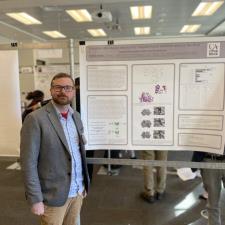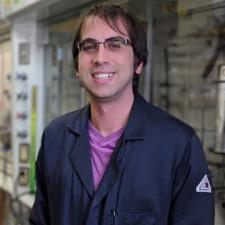1,710 Answered Questions for the topic biochemistry
07/18/19
Do two compatible tRNA codons bond together?
Can two tRNA with complementary anti-codons link together? For instance UUU with AAA. If not, why not?
07/18/19
Do chaperone proteins misfold?
If molecular chaperone proteins assist in the folding process of other proteins and misfolded proteins, can chaperone themselves misfold since they are also proteins? What would happen if...
more
Biochemistry Metabolism
07/17/19
Energy released during the production of ATP?
When glucose is used during aerobic and anaerobic exercise, how much energy is expended or required?During aerobic exercise:$C_6H_{12}O_6 + 6 O_2 \ o ATP + H_2O + 6 CO_2$ + energyDuring anaerobic...
more
Biochemistry Protein Folding
07/17/19
Why are proteins in the insoluble form when they are in frozen water?
Why would lowering the temperature of water change the intermolecular forces so much that proteins once soluble in water, become insoluble? I know freezing can create a crystal lattice, but I don't...
more
07/17/19
Why should phospholipid non-polar tails be "protected" in the membrane bilayer?
>lipids are arranged within the membrane with polar head towards the outer side and non polar tails towards inner side, this ensures that the non polar tail is protected from aqueous...
more
07/17/19
Do disaccharidases require a cofactor or coenzyme to function?
I'm doing research on lactose intolerance and am curious if disaccharidases (enzymes that break down disaccharides) require a cofactor or coenzyme to function? Reviews or references would be...
more
Biochemistry Proteins
07/17/19
Is there a difference between polarity and hydrophobicity?
From literature the two terms seem to be interchangeable when discussing protein domains and motifs. But biochemically, what are the specific differences between these two terms? For example what...
more
Biochemistry
07/16/19
Why doesn't life produce diamond, graphene, nanotubes, etc? Could it?
It seems that life is really good at assembling carbon into extremely complicated molecules (e.g. DNA). Graphene is stronger than any materials currently used by biology. Diamond is harder than any...
more
07/15/19
Can we investigate the cell biology of extinct microorganisms?
I know that there are microfossils, but not if we can we know about the organelles, genetics or macromolecules of the cells that left them behind.
07/12/19
Does alpha-amylase from different species have different *optimal* conditions?
Do the optimal conditions for the enzyme isoforms differ between species? Specifically, do the optimal pH and temperature for alpha-amylase differ for that enzyme produced by *B. lichiniformis* and...
more
Biochemistry Physiology
07/12/19
Does NADH inhibit gluconeogenesis?
I was told in a physiology lecture that alcohol inhibits gluconeogenesis because 'NADH produced from ethanol catabolism leads to product inhibition'.But is NADH not a reactant coenzyme of...
more
07/12/19
What are 'acid stable' amino acids?
I tend to see terms `amino acid`, `acid stable amino acid`, and `free amino acids` used often in the field of nutrition, but they are sometimes used interchangeably which confuses me. I know that:-...
more
07/11/19
Can bacteria metabolize fatty acids for fuel?
I'm not a microbiologist, but rather a physiologist curious about microbial metabolism. Much like humans bacteria can utilize glucose, but when it comes to long chain, medium chain, or short chain...
more
07/11/19
Calculating Percent Yield Question
Aluminum oxide is produced in a single replacement reaction between aluminum and chromium (II) oxide. Calculate the percent yield if 603.0g of chromium(II) oxide were used with 422.5g of aluminum...
more
07/10/19
What is an irreversible reaction?
There are reactions with large Delta G negative values. Why these reactions are irreversible? As in: out of 10 steps of Glycolysis, 3 are irreversible steps. I need an explanation for why they are...
more
07/10/19
Why restriction enzymes cut (usually) at palindromic sequences?
Restriction enzymes usually cut only at palindromic sequences. Is there any specific reason for that ? Is there any advantage for bacteria if it cuts up virus at this type of sequences ?
07/10/19
What is the difference between a protein and a factor?
In terms of nomenclature/semantics, why are some proteins named proteins, and some named factors?I've been revising on eukaryotic DNA, and I've come across some proteins that seem to serve roughly...
more
Biochemistry Hematology
07/09/19
When giving blood, what is the specific Iron measurement they take?
I went to give blood the other day, and they take an "iron" measurement prior to actually drawing the blood. My level was 16.4 -- but what specific type of iron were they measuring? I've heard of...
more
Biochemistry Proteins
07/09/19
Why is absorbance at 280 nm for protein solution going up when I measure repeatedly?
I have been measuring my protein solutions' concentrations by diluting them in water 20 fold with a final volume of 100 uL and then measuring the absorbances of these solutions in 96 well plates...
more
07/09/19
What is an aromatic cage and what does it do?
Epigenetics, 2. ed, Chapter 3.6:> Similarly, methylated lysine residues embedded in histone tails can be> read by “aromatic cages” present in chromodomains, or similar domains> (e.g., MBT,...
more
07/08/19
Why are enzyme-catalysed reactions slower at lower substrate concentration?
Suppose I'm using 200 nmoles of enzyme and 2 mmoles of substrate. The enzyme should be saturated but if I use 50 mmoles of substrate, the reaction will be faster. Why?I just can't get it! Even at...
more
What exactly makes bananas go brown?
I know that often oxidation processes are mentioned when referring to the color change from yellow to brown in bananas (specifically: those that you get everywhere in supermarkets, with no...
more
07/08/19
Why do red blood cells maintain Iron in the Haem group in the +2 (ferrous) oxidation state?
A lot of sources tell me that RBCs contain a number of enzymes, and that these serve multiple functions from maintaining the structure and elasticity of the corpuscle wall, to preventing the...
more
07/05/19
Is there a reliable source for storage and stability of reducing agents like DTT?
Reading the literature on DTT, one is confronted with a confusing mass of papers; some claim that a 1M solution in water is stable, other papers say it is not. I use the reaction with DTNB to show...
more
Biochemistry Cellular Respiration
07/05/19
How is respiration an unbalanced equation?
The equation for respiration is...
more
Still looking for help? Get the right answer, fast.
Ask a question for free
Get a free answer to a quick problem.
Most questions answered within 4 hours.
OR
Find an Online Tutor Now
Choose an expert and meet online. No packages or subscriptions, pay only for the time you need.




















